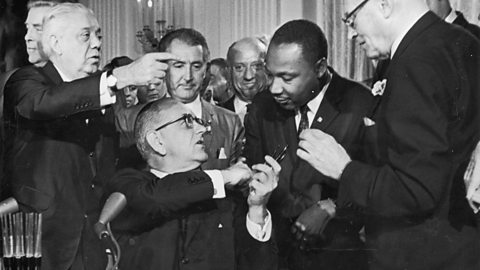Role of government in improving civil rights in the 1960s
The attitudes of US presidents to civil rights
President Kennedy
President Kennedy was an open supporter of civil rights. Examples of Kennedyâs actions are:
- He appointed Thurgood Marshall to be a senior federalPart of the government of the USA as a whole rather than relating to an individual state. judge in 1962. Marshall was one of the National Association for the Advancement of Colored People NAACPThe National Association for the Advancement of Colored People was created in 1909 to eliminate race-based discrimination across the United States of America. lawyers involved in the Brown v Board of Education of Topeka case.
- He was prepared to intervene when there was evidence of individual state governments trying to avoid implementing civil rights rulings. For example, he threatened to sue the state of Louisiana for refusing to fund desegregationRemoval of laws that separate people from different races in public places and day-to-day life. schools.
- In 1962, Kennedy sent large numbers of federal troopsArmed forces controlled by the president in Washington, DC. and US MarshalsOfficers in the USA who enforce federal laws and respond to crisis situations. to protect a black American student, James Meredith, as he attended the University of Mississippi. The university had previously only admitted white students. Meredith had faced a lot of opposition to his application.
- In 1963, Kennedy pressured Governor George Wallace to force the police to release the protesters jailed in the Birmingham marches and to give more jobs to Black Americans.
- In 1963, Kennedy gave a speech on civil rights on the radio and television in which he talked of the importance of supporting racial equality.
- In 1963, Kennedy began getting CongressThe legislative body of the US government, made up of the Senate and the House of Representatives. to pass a law to end segregationThis meant that white people and black people had to live separately. The areas of society affected by segregation included churches, hospitals, theatres and schools. and discriminationTo treat someone differently or unfairly because they belong to a particular group. against black Americans. This was passed by his successor, President Lyndon B Johnson, after Kennedyâs assassination.
President Johnson
Lyndon B Johnson had been Kennedyâs vice president. When he took up the role of president, many people were unsure whether he would continue with Kennedyâs policies on race and society. Johnsonâs changes to policies were not specifically designed to help those who were being discriminated against due to race, but his support for the poorest benefited many African Americans. These changes included:
- pledging $800 million to tackle poverty, which supported many African Americans who were below the poverty lineThe estimated minimum level of income needed to secure the necessities of life.
- providing medical support to over-65s
- granting scholarships to students who could not afford the entrance fees to university
- improving housing for the poorest people in society
1964 Civil Rights Act

President Kennedy started work on a new civil rights bill in 1963. It faced a lot of opposition from southern politicians in Congress. After Kennedyâs assassinateMurder for religious or political reasons. President Johnson persuaded Congress to pass the bill into law in Kennedyâs memory. This divided opinion - some black Americans thought it was too little, too late. Many non-black people in the southern states, including politicians, strongly disapproved of it. They thought it went too far. Johnson felt that the signing of the bill would turn many southern voters against his Democratic Party for a âgenerationâ as they were so opposed to how it supported African Americans.
The 1964 Civil Rights Act included terms that did the following:
- banned segregationThis meant that white people and black people had to live separately. The areas of society affected by segregation included churches, hospitals, theatres and schools. in public places, businesses (such as restaurants and hotels) and education
- made the federal government responsible for bringing prosecutions against people and businesses that were accused of discrimination
- put the Fair Employment Practices Committee in charge of making sure that people were not being discriminated against at work
- created the Equal Employment Opportunity Commission to enforce the act
My fellow citizens, we have come now to a time of testing. We must not fail. Let us close the springs of racial poison. Let us pray for wise and understanding hearts. Let us lay aside irrelevant differences and make our nation whole.
The impact of the 1964 Civil Rights Act
More guides on this topic
- Anti-Communism c.1945-1954 - OCR A
- African Americans c.1945-1954 - OCR A
- Broadening of the campaigns for civil rights - Race - OCR A
- Broadening of the campaigns for civil rights - Women's rights - OCR A
- Broadening of the campaigns for civil rights - Gay rights - OCR A
- Politics and protest - OCR A
- Social problems and attempts to tackle them - OCR A